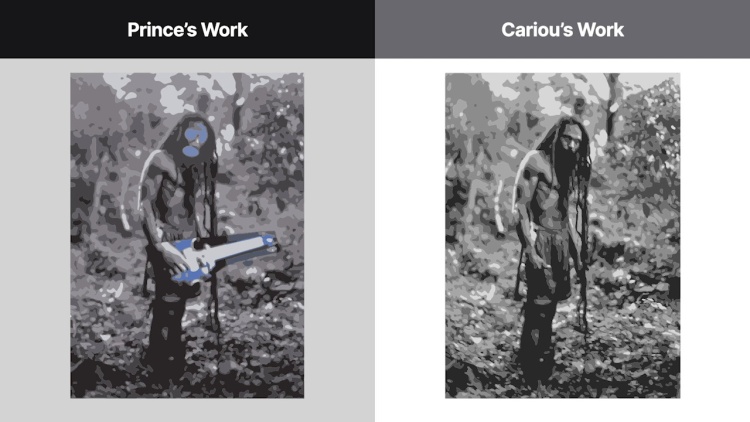Cariou v. Prince
United States Court of Appeals for the Second Circuit
714 F.3d 694 (2013)
- Written by Rose VanHofwegen, JD
Facts
Photographer Patrick Cariou (plaintiff) published a book of serene, composed, black-and-white portrait and landscape photographs from Jamaica called Yes Rasta. It sold less than 6,000 copies and earned less than $8,000. Acclaimed appropriation artist Richard Prince (defendant) used Cariou’s photographs in crude collages, incorporating them into 30 large, provocative artworks. Some used a small Cariou headshot with other photographers’ shots in a much larger painting all but obscuring Cariou’s photo, but Cariou’s photos remained readily apparent in five others. One reproduced a Cariou photograph of a man, added soft focus and blue tint, blurred his facial features, and superimposed a guitar over his hands. When Prince’s works were displayed in a gallery, another gallery owner, Cristiane Celle, passed on doing a Rasta show of Cariou’s photos, mistakenly thinking it had already been done. Cariou sued Prince, the gallery, and its owner for copyright infringement. After Prince testified saying he lacked interest in the original artists’ intent in appropriated pieces, the trial court found Prince’s works not a fair use of Cariou’s photographs because they did not comment on or reference Cariou, the original photos, or their historical context and damaged Cariou’s market by deterring the Rasta show. Prince appealed.
Rule of Law
Issue
Holding and Reasoning (Parker, J.)
What to do next…
Here's why 907,000 law students have relied on our case briefs:
- Written by law professors and practitioners, not other law students. 47,100 briefs, keyed to 996 casebooks. Top-notch customer support.
- The right amount of information, includes the facts, issues, rule of law, holding and reasoning, and any concurrences and dissents.
- Access in your classes, works on your mobile and tablet. Massive library of related video lessons and high quality multiple-choice questions.
- Easy to use, uniform format for every case brief. Written in plain English, not in legalese. Our briefs summarize and simplify; they don’t just repeat the court’s language.





